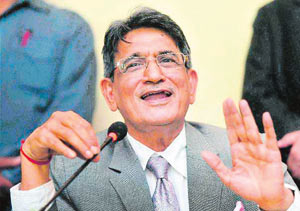Cricket reforms: Take a cue from the Lodha report
View(s): Talking of winds of change, sometimes even the most dominant subjects — whatever they may be — could wilt under the sheer influence and power of it. The reasons may be many or singular but, if the prevalent situation is not in harmony with the accepted norms, someone may stop playing the viola and the whole symphony ceases. Though it may be divided into boundaries, cricket in the Indian subcontinent has more similarities than differences, and definitely is on the upward trend where the global scale of exchanges is concerned. Right now, Pakistan and India are up there in the clouds. Bangladesh is definitely developing fast. The only tentative subject is Lankan cricket and, if that too gets the nourishment it needs for sustenance, it certainly can improve. But that is exactly our problem, too.
Talking of winds of change, sometimes even the most dominant subjects — whatever they may be — could wilt under the sheer influence and power of it. The reasons may be many or singular but, if the prevalent situation is not in harmony with the accepted norms, someone may stop playing the viola and the whole symphony ceases. Though it may be divided into boundaries, cricket in the Indian subcontinent has more similarities than differences, and definitely is on the upward trend where the global scale of exchanges is concerned. Right now, Pakistan and India are up there in the clouds. Bangladesh is definitely developing fast. The only tentative subject is Lankan cricket and, if that too gets the nourishment it needs for sustenance, it certainly can improve. But that is exactly our problem, too.
How on earth are we going to accomplish that sticky task? Internal strife has been a part and parcel of our cricket — and, besides Bangladesh which is relatively young in comparison to the others, the other two South Asian cricketing nations have had their own fair share of problems. Pakistan struggled for a long period, may be from the early 1960s, and finally coasted towards a new constitution in 2014. Since then, it seems they have managed to overcome some of the problems they encountered administratively. Now, Pakistan Cricket is improving and the results are more than evident. It was only last week, even without a proper home venue, Pakistan were in a position to beat England in England.
On the contrary, India, cricket-wise, has a very strong base and the game’s structure is well formulated but, with the introduction of the Indian Premier League (IPL), their cricket was overcast with a spate of unbecoming occurrences. However, on Monday there was a Supreme Court ruling which effected some sweeping changes to make the game more transparent. More than a year ago, a panel comprising Justice R.M. Lodha and retired Supreme Court judges, Ashok Bhan and R. Raveendran were asked to determine suitable punishments for Rajasthan Royals official Raj Kundra, Chennai Super Kings official Gurunath Meiyappan (son-in-law of former BCCI strongman N. Srinivasan) and others for their roles in the 2013 IPL scandal.
 In a bid to prevent sporting fraud and conflicts of interest, the committee this week proposed changes to the BCCI’s functions. In spite of India being one of the strongest cricketing entities in the world, the inner circle of the game also has been equally supple and, as a result, they have the wherewithal to thwart the maneuverings of personalities as powerful as IPL mentor Lalith Mody. Now, they cut a fresh niche in their cricketing annals by making the Lodha ruling a reality. To my mind, the Lodha rulings were powerful and sweeping. There are lessons we could learn from this Lodha ruling. For instance, it says that no Minister is eligible hold office within the Indian framework. Here, in Sri Lanka, we too can take the cue. Preceding the Lodha report by a day was the making public of the Wettimuny Papers.
In a bid to prevent sporting fraud and conflicts of interest, the committee this week proposed changes to the BCCI’s functions. In spite of India being one of the strongest cricketing entities in the world, the inner circle of the game also has been equally supple and, as a result, they have the wherewithal to thwart the maneuverings of personalities as powerful as IPL mentor Lalith Mody. Now, they cut a fresh niche in their cricketing annals by making the Lodha ruling a reality. To my mind, the Lodha rulings were powerful and sweeping. There are lessons we could learn from this Lodha ruling. For instance, it says that no Minister is eligible hold office within the Indian framework. Here, in Sri Lanka, we too can take the cue. Preceding the Lodha report by a day was the making public of the Wettimuny Papers.
This document was handed over to Prime Minister Ranil Wickremesinghe and Sports Minister Dayasiri Jayasekera, at the end of the tenure of the Interim Committee led by Sidath Wettimuny. It seeks to change the constitution of the governing body which is highly politicised and, as a result, riddled with corruption and debt. The Paper points out that since the meteoric rise in Lankan Cricket, after Sri Lanka won the Cricket World Cup in 1996, there were some happenings that seemed detrimental to the wellbeing of the game of Cricket in Sri Lanka. The concept paper says: “After 1996, when Sri Lanka won the ICC World Cup, the entire character of Cricket in Sri Lanka changed immeasurably.
 There was not only a rapid improvement in the standard of Cricket in Sri Lanka, but also a regular flow of very substantial funds into SLC by way of TV Sponsorships, Shares of Revenue from ICC Tournaments and other sources. This resulted in many businessmen, politicians and others seeking Office in SLC, as they perceived these positions to be attractive and lucrative. ”These ambitions caused many an unseemly scramble at Elections to SLC’s Executive Committee, which have been hotly contested by rival groups who campaign intensely for the 147 “votes” held by 85 member Clubs and Associations, some of whom do not play serious Cricket.
There was not only a rapid improvement in the standard of Cricket in Sri Lanka, but also a regular flow of very substantial funds into SLC by way of TV Sponsorships, Shares of Revenue from ICC Tournaments and other sources. This resulted in many businessmen, politicians and others seeking Office in SLC, as they perceived these positions to be attractive and lucrative. ”These ambitions caused many an unseemly scramble at Elections to SLC’s Executive Committee, which have been hotly contested by rival groups who campaign intensely for the 147 “votes” held by 85 member Clubs and Associations, some of whom do not play serious Cricket.
It is common knowledge that, many of these “votes” are sometimes the target of financial and other types of inducements. Further, Elections have often been subject to political influences. ”This has resulted in a widespread perception that the outcome of SLC Elections are decided by factors not linked to the objective suitability of the candidates to hold Office for the benefit of Cricket in Sri Lanka. There have also been constant suspicions and, at times, accusations of the misuse of funds and corruption by elected SLC Officials and detrimental interference by them in SLC’s management. “A combination of these factors and, at times, other political motivations have resulted in the Minister of Sports repeatedly exercising the power vested in him by the Sports Law, to dissolve the elected Executive Committees of SLC and appoint Interim Committees to run SLC.
This has occurred 7 times from 1999 onwards.” From that point onwards the Paper explains the proposed reforms in detail. However, the mentor of the Paper, Sidath Wettimuny, speaking exclusively to the Sunday Times Musings, points out that this document need not be the last word, but a solid foundation for a forum where a workable final draft could be formulated. Wettimuny explained: “We brought forth this document as a guide for change. We could take each point in it on its own merit and make an analytical assessment of them, and see how it could be placed in its right perspective. “At the moment, there is a dire need for change, because politicisation of the game of cricket is at its highest, and it is detrimental to the progress of cricket in the country.
Way back then, the K.B. Ratnayake changes in the Sports Law were effected for a singular purpose, not to take advantage of it and run the sport according to their whims and fancies. See the Lodha report and the changes that it effects. Now it will bring sweeping changes to Indian cricket, and it will get enriched by it.” At this end, we too are looking to clean up the stables. It necessarily means ridding someone of his powers and a cohesive change of governance, so that, Sri Lanka would not end up facing the same fate as that of Zimbabwe Cricket.


